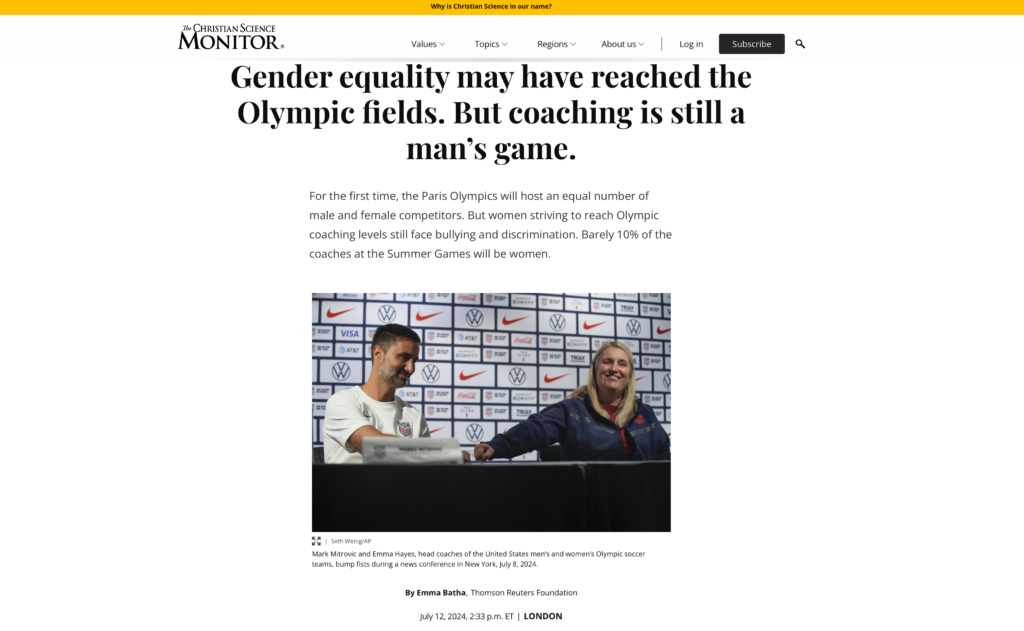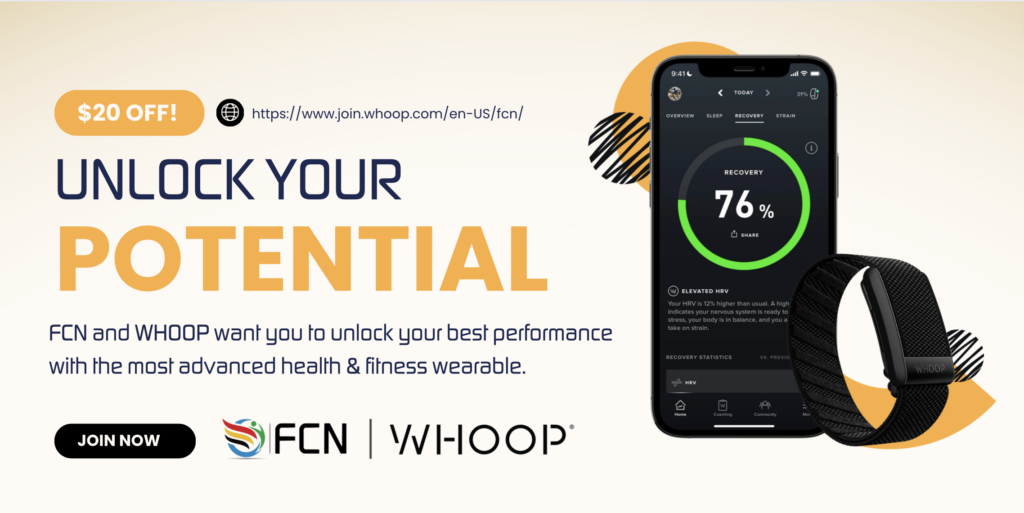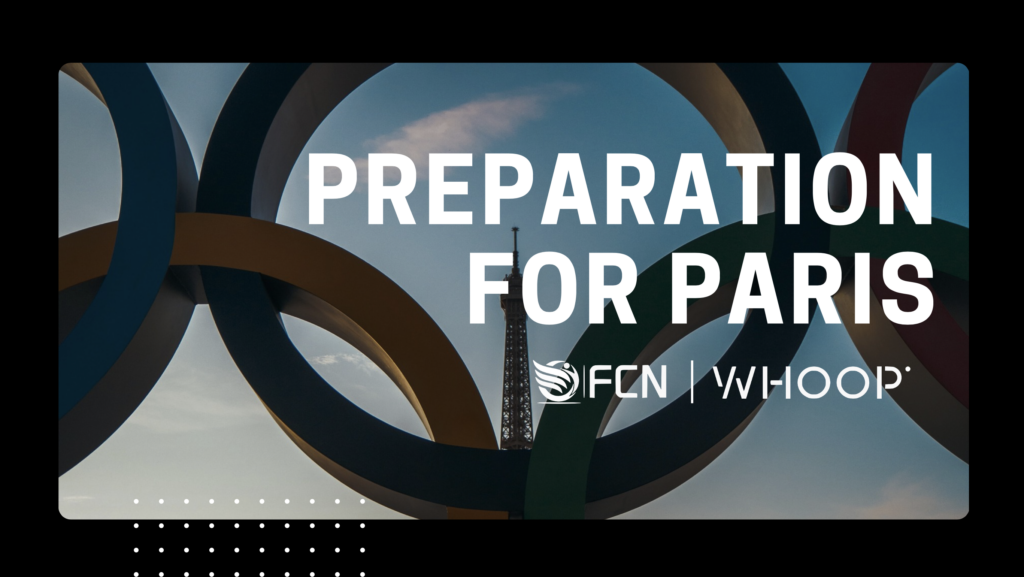
Preparation for Paris is an innovative partnership between the Female Coaching Network and WHOOP, designed to support elite female coaches as they prepare for the Paris Olympic and Paralympic Games.
This unique initiative brings together 52 coaches from 15 countries and 19 sports, forming a collaborative coaching community. Participants in the program will connect, share and develop as a team while learning from experts about the importance of their well-being. As part of this effort, coaches receive a complimentary WHOOP strap and membership to track their health markers and determine optimal protocols for their health and performance. Throughout the program, from December 2023 to October 2024, coaches will monitor their sleep, recovery, strain, stress, and overall health using WHOOP, the most advanced fitness and health wearable device available today. By the end of 2024, WHOOP will be publishing the findings of their research and the impact the project had on the coaches performances.
Additionally, the coaches are actively engaged in a WhatsApp group, providing a platform to share experiences and advice as they approach the Games. It is crucial for coaches to remember that they, too, are performing on the road to the Olympic and Paralympic Games. By prioritising their health and utilising such a network, they can be more effective in supporting their athletes and perform at their best when the pressure hits!
Get Your Exclusive FCN WHOOP Discount!
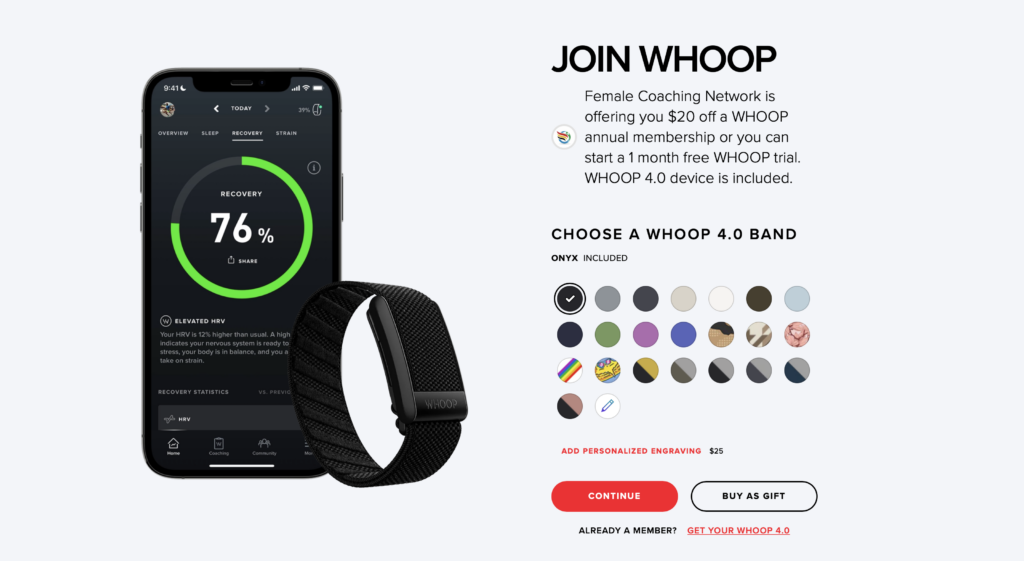
Background
While the effects of stress on athletes’ performance have garnered considerable attention, there has been comparatively less emphasis on coaches, especially those operating at the elite level. According to the research paper ‘Olympic and Paralympic Coaches Living with Stress’, “coaches are often seen as the source of solutions as opposed to requiring help themselves”. The paper goes on to say; “Coaches must also be considered as performers in their own right and need the same level of help, support and research as the athletes in their charge.”
Due to the demanding nature of this elite environment, coaches often find it difficult or are hesitant to seek support when they experience stress. There is a need to appear strong and in control and always have the answers. The burden of these stressors can lead to a myriad of symptoms on the body and mind including; anxiety, fatigue, overwhelm, alcohol abuse, depression, insomnia, and even anger issues. Whilst this stress is inevitable and unavoidable, it’s not something elite coaches should ignore. It is essential for the coach to develop effective coping mechanisms and establish these as part of their own routines, away from the routines of their jobs.
Networking has been identified as a key coping mechanism for female leaders and coaches, and yet is something they lack within the elite sporting world. On average at every Olympic Games (both summer and winter), only 11% of coaching accreditations go to female coaches. Across Countries and Continents, this percentage ranges from as low as 1%. This scarcity of female coaches means less opportunity to network, giving them less opportunities to access valuable resources (such as mentoring and knowledge sharing) and less opportunity to learn how to navigate professional obstacles.
Webinars
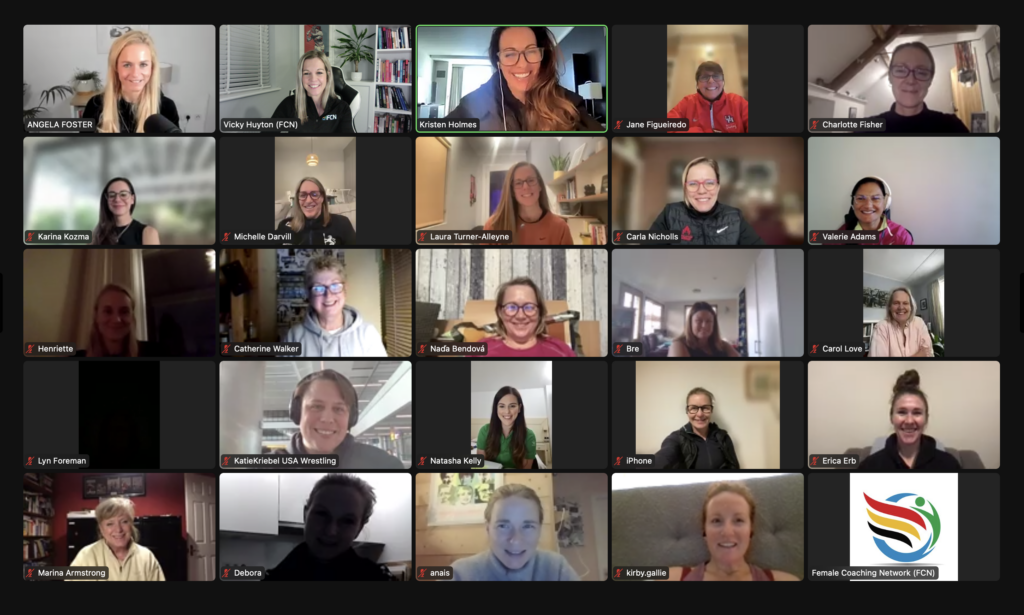
January 2024 – Master Your Energy and Avoid Burnout with Angela Foster – focussed on strategies for coaches to master their energy in the lead up to Paris. Key topics included the importance of staying above the line for optimal performance, the role of play and micro-breaks in recovery and the shift protocol.
February 2024 – Circadian Rhythms and Health with Kristen Holmes – focused on strategies for coaches to understand the importance of and control of circadian. Key topics included the various aspects of perofrmance and how life affects rhythms, how to manage jet leg and how to peak for certain times of the day.
March 2024 – Performance Under Pressure with Rachel Vickery – delved into the intricacies of team dynamics and explored the concept of individual and team play. Key topics included examining the physiological responses of stress and negative stimuli and offered strategies to manage arousal states to enhance performance.
May 2024 – Two Tools for Managing Training State with Chris Chapman – emphasised the importance of performance state for both coaches and athletes. Key topics were performance state awareness and regulation and training not to failure.
June 2024 – A Recap with Kristen Holmes, Rachel Vickery and Angela Foster – the last webinar in the programme is an opportunity for three speakers to remind coaches of the learnings and leave them with some lasting tips and advice as they enter the Paris Olympic and Paralympic Games.
Members of Preparation for Paris
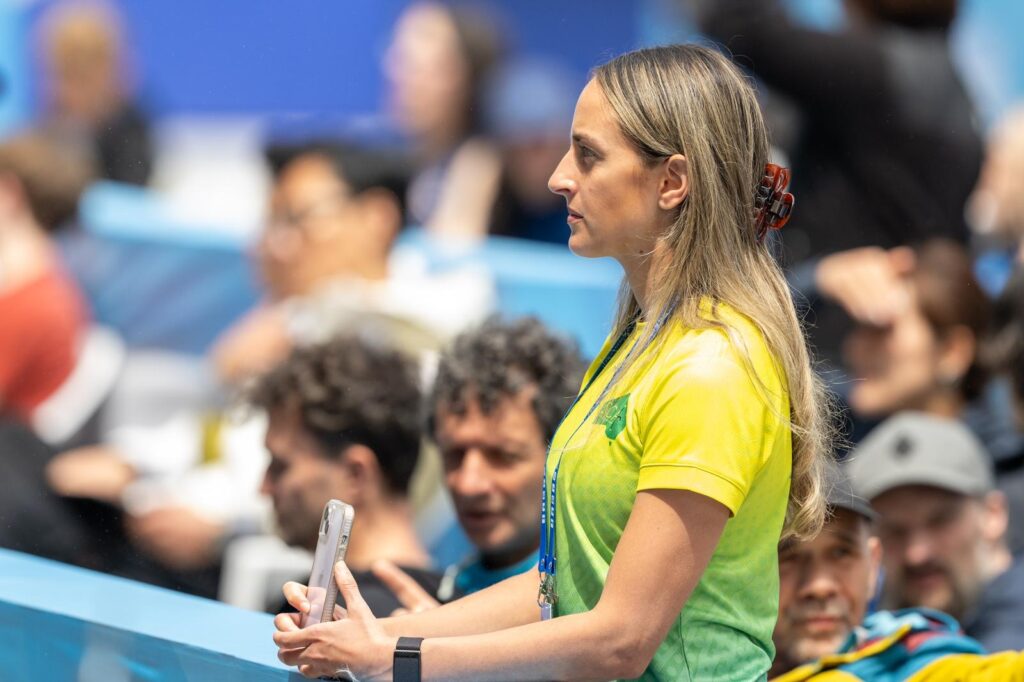
Preparation for Paris Member – Irene Torrealba (Australia) Climbing
Aimee Boorman (USA) Gymnastics
Alison O’Riordan (UK) Track & Field
Amanda Rego (USA) Track & Field
Anais Second (France) Shooting
Ashley Kovacs (USA) Track & Field
Aukje van Weert (Netherlands) Climbing
Breanne Clement (Australia) Track & Field
Bruna Accorsa (Australia) Boccia
Carla Nicholls (Canada) Track & Field
Carol Love (Canada) Rowing
Carole Bam (Belgium) Track & Field
Casey Atkins (Swimming) Australia
Cathy Walker (GB &NI) Track & Field
Charlotte Fischer (GB &NI) Track & Field
Danielle Boyd (GB &NI) Football
Debora Pijper (Ireland) Dressage
Ellen Minzner (USA) Rowing
Ellen Randall (Australia) Rowing
Erica Erb (USA) Lacrosse
Erika Wheeler (USA) Track & Field
Frida Lindahl (Sweden) Track & Field
Hayley Harrison (Ireland) Track & Field
Helen Clitheroe (GB & NI) Track and Field
Henriette Mere (Norway) Triathlon
Irene Torrealba (Australia) Climbing
Ivi Casagrande (Brazil) Football
Jackie Newton (GB & NI) Track & Field
Jane Figueiredo (GB & NI) Diving
Janelle Pallister (Australia) Swimming
Jessica Medina (USA) Wrestling
Karina Kozma (Hungary) Kayaking
Katie Kriebel (USA) Wrestling
Kelsey Quinn (USA) Track & Field
Kirby Gallie (Switzerland) Rowing
Laura Turner-Alleyne (GB & NI) Track & Field
Leanne Choo (Australia) Badminton
Lyn Foreman (Australia) Track & Field
Marina Armstrong (GB & NI) Track & Field
Michelle Darvill (Netherlands) Rowing
Mechelle Lewis Freeman (USA) Track & Field
Nada Bendova (Slovakia) Track & Field
Natasha Kelly (Ireland) Triathlon
Nicolai Morris (Australia) Hockey
Nicole Pratt (Australia) Tennis
Raylene Bates (New Zealand) Shooting
Sara Symington (GB & NI) Cycling
Shannon Winzer (Canada) Volleyball
Sonia O’Sullivan (Ireland) Track & Field
Valerie Adams (New Zealand) Track & Field
Feedback from our Members
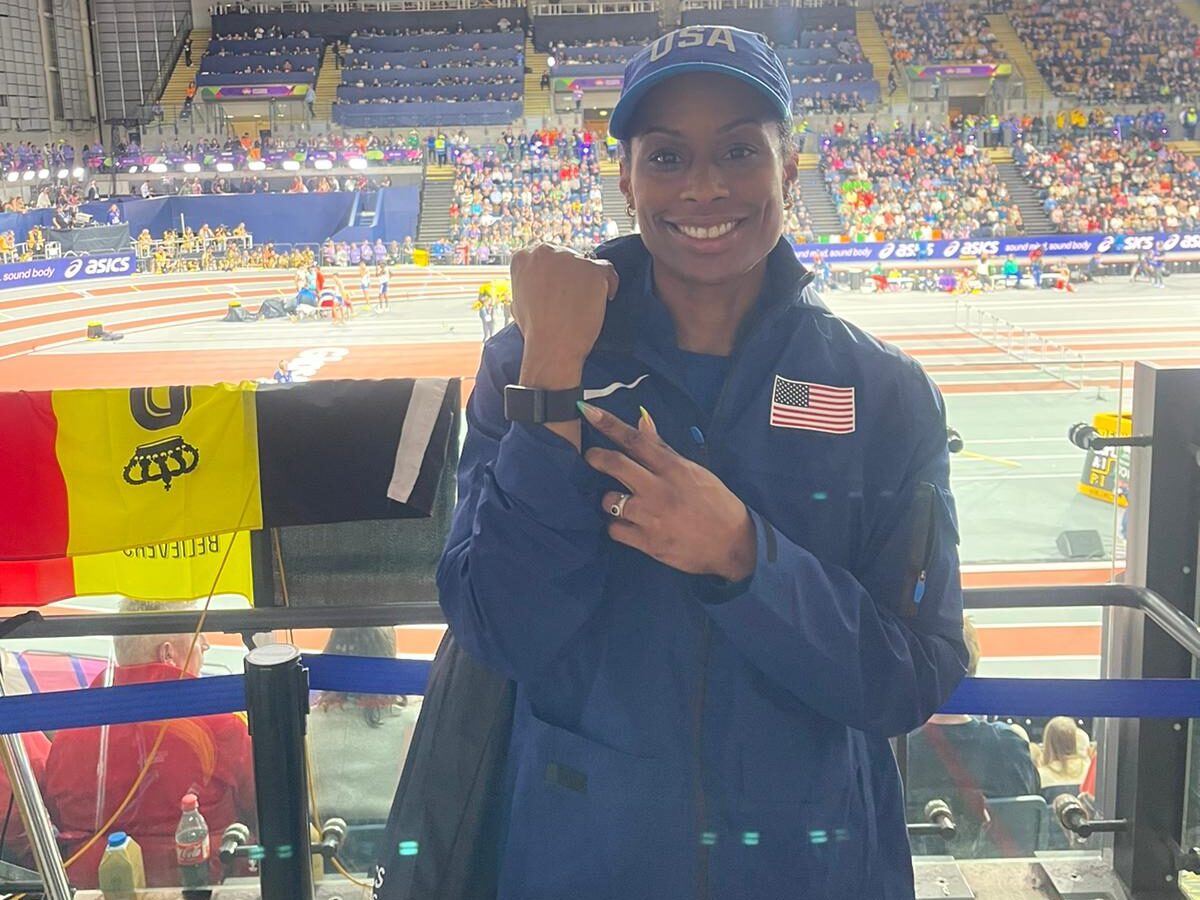
“Being part of the Preparation for Paris programme has been an incredible journey of growth and collaboration. The wealth of knowledge and resources shared within this group of inspiring women has been truly transformaRve. Together, we have created a supportive space where we learn, grow and uplift one another, unlocking our potential as coaches.”
Valerie Adams, Track & Field, New Zealand
“Being part of this group has had a very powerful effect on me. The knowledge and experience is unmatched, these women inspire me to be better every day. The first webinar was the perfect foundaRon of how to structure our life as coaches, the message is clear to take care of ourselves first to be able to look aSer other. We as coaches tend to put ourselves last and when we are surprised we cannot pour from an empty cup. For me personally, the biggest lightbulb was the quote “Resistance is your North Star” – where we feel the biggest resistance is what we should lean in to the most. If there is anything I can take away that will motivate me to do better everyday is another quote “every action you take is a vote for the type of person you wish to become.”
Karina Kozma, Physiotherapist and S&C Coach, Hungary
“For me, with my score of 20, there is huge room for improvement…thanks to the FCN and WHOOP I can start thinking about improvements and changing my mind and life.”
Nada Bendova, Track and Field, Slovakia
“I’’m over excited to be part of this program with so many amazing talented coaches, being able to connect with these strong women that understand the struggles of high performance, where we can be vulnerable and celebrate everyone achievements has been very powerful and inspirational, especially coming from a very new sport, Sport Climbing.
The Whoop as well has been a fantastic tool to prioritise my recovery with the increasing demands of the Olympic year, so I’m very grateful to have this extra help and the webinars have been a great source of information to optimise my recovery and health and connect with the incredible leaders in High Performance sports. Just a great opportunity to be part of it!”
Irene Torealba, Climbing, Australia
Support from the Australian Institute of Sport
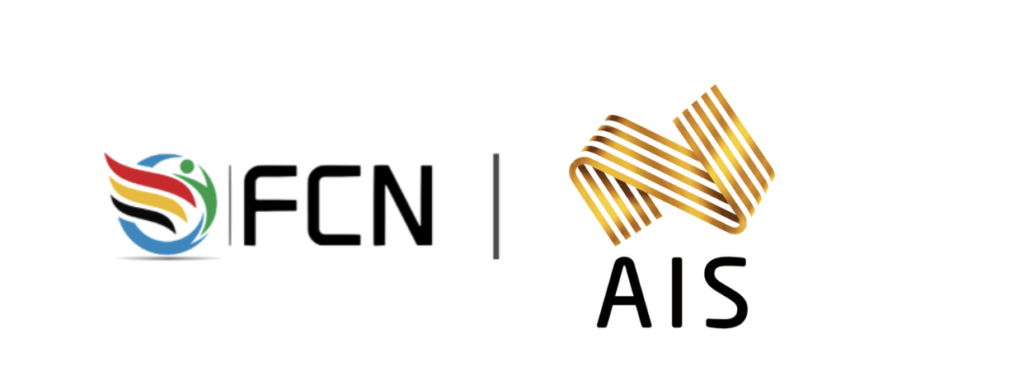
Ten Aussie coaches have formed an unlikely alliance with their rivals in the lead-up to the Paris Olympic and Paralympic Games.
The Female Coaching Network (FCN) and WHOOP are partners in an innovative global program designed to support the needs of female coaches, with the Australian Institute of Sport (AIS) playing a pivotal role in its development.
In an increasingly competitive environment, the program builds a collaborative community and ensures all individuals find the balance required to unlock peak performance in their athletes.
Bringing together 52 coaches from 15 countries and 19 sports, this coaching community was initiated by FCN and AIS at the end of 2023. Through WhatsApp and monthly webinars, participants have been connecting, sharing, and developing as a cohesive team while learning from a range of experts on the importance of their own well-being.
Coaches often overlook their own performance needs while preparing for the Olympic or Paralympic Games. This program emphasises the critical importance of self-care, highlighting how coaches’ well-being directly impacts their effectiveness in guiding athletes. Preparation for Paris focuses on helping coaches understand and improve their sleep, strain, and recovery through cutting-edge techniques and support.
This initiative marks a significant step in enhancing the health and performance of coaches as they prepare for the 2024 Games, ensuring they are at their best to support their athletes.
CLICK HERE for full story
Feature in the Guardian Newspaper – June 2024
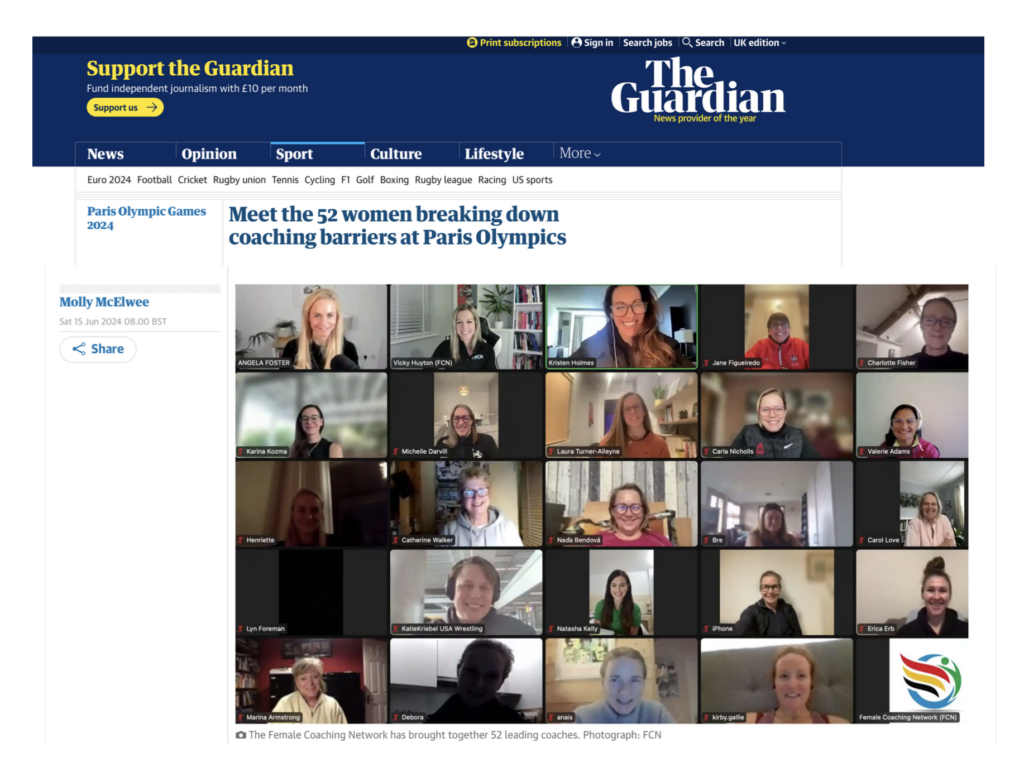
Take a look inside the coaching WhatsApp group behind Simone Biles, Tom Daley and Sha’Carri Richardson
A big thanks to journalist Molly McEllwee for the incredible piece about the Preparation for Paris programme! Take a look at the article below, or CLICK HERE for the full link.
In January 52 phone numbers were added to a new WhatsApp group. It was called “Preparation for Paris” but may as well have been dubbed the Golden Group, assuming things go to plan this summer. Those phone numbers belonged to 52 leading coaches aiming for Paris 2024, hailing from 15 different countries and 19 sports. All of them are women.
It includes the two-times Olympic champion New Zealand shot-putter Valerie Adams, now a coach and chair of the World Athletics Athletes’ Commission. Simone Biles’s former coach Aimee Boorman is also there. So too is the Olympian Sara Symington, now head of Olympic and Paralympic programmes for British Cycling. The former American sprinter Mechelle Lewis Freeman is also involved, as coach for the USA women’s relay team, managing stars including Sha’Carri Richardson. Another is Jane Figueiredo, the longtime coach to British diver Tom Daley, set to compete at his fifth and final Olympics.
This network of women may be separated by thousands of miles but they have all beaten the odds to target the pinnacle of their sport. In Tokyo three years ago only 17% of the coaches were women. That number is expected to rise to 25% this year, but it remains a small minority – especially for a Games branding itself as the “#GenderEqualOlympics” owing to a 50-50 gender split among Olympic athletes for the first time.
“It’s quite a lonely place, coaching or leading certain programmes,” Symington says. “The fact a community of women has been created, even on a WhatsApp group, has been incredible. Women tend to have more impostor syndrome – I do – and it’s having that encouragement to have confidence in what you’re doing. I’ve just learned that you’re not in it alone.”
Featured in Ashai Shimbun, Japan – July 2024
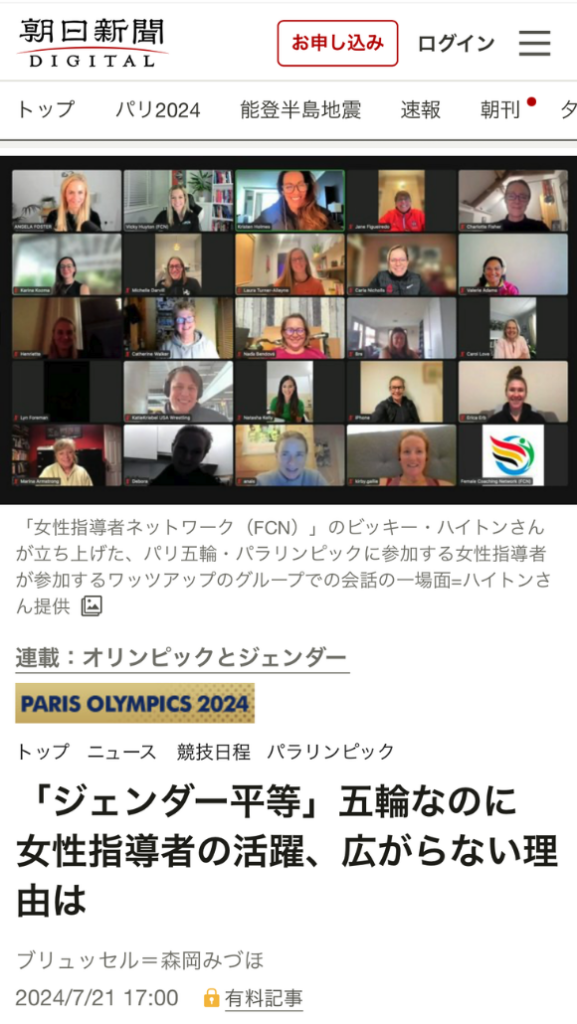
Featured in The Christian Science Monitor – July 2024
